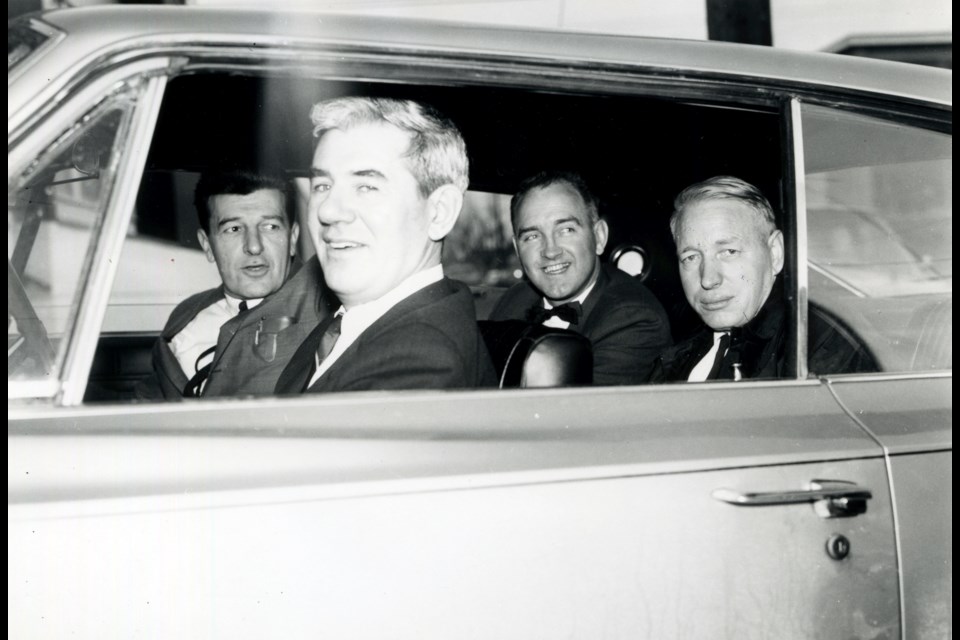The workers had had enough. Negotiations over wages and hours had stalled at the Lenkurt Electric telecommunications equipment manufacturing plant on Lougheed Highway in Burnaby.
The union and company had agreed to an overtime ban, but a higher-up at the company had overturned it.
And so, they walked.
The wildcat strike of 1966 would affect more than just Lenkurt Electric, more than the 257 workers who walked the picket line and more than the local labour movement. It would be a major influence on changes to B.C. labour legislation in coming years.
There wasn’t anything extraordinary about the initial negotiations with the members of the International Brotherhood of Electrical Workers, Local 213, according to Rod Mickleburgh, author of On the Line: A History of the British Columbia Labour Movement.
But the company’s reversal on the overtime ban was the final straw, he said.
“Difficult negotiations were going on, and, at a certain point, the workers at the plant, they felt betrayed by the company’s stance in negotiations and didn’t wait for a strike vote or anything,” Mickleburgh said. “Two hundred and fifty-seven of them walked off the job on April 27, 1966.”
“There must’ve been a lot of unhappiness with management to begin with, because you don’t get 257 people – many of them women – suddenly walking off the job in an illegal strike without quite a buildup,” he added.
In response to the wildcat strike, the company fired all of the workers who had walked out.
The atmosphere on the picket line was tense, as co-workers who had not walked out crossed the line to get to work every morning. New employees were hired as well, and police escorted them into the plant.
“There were lots of scuffles, and it was turning into quite an intense confrontation already,” Mickleburgh said.
Then, the international representative of the IBEW and the president of local 213 brokered a deal with the company, one that did not guarantee all the workers would be rehired or maintain their seniority.
“The business agent, a fellow named Art O’Keeffe, refused to implement the deal that had been worked out, and the workers turned it down by an enormous margin because again, it didn’t guarantee that these workers would be rehired, and they could be picked off, one by one,” Mickleburgh said.
O’Keeffe was fired, though workers later brought him back to his office when the executive was having a meeting there, and then they carried the union president out to the street, according to Mickleburgh.
The local labour movement was angry, seeing the deal as a betrayal by the international union. They came out in support of the workers, walking the picket lines alongside them, even though there was a court injunction against picketing and many strikers were being arrested.
Things came to a head on May 11, 1966.
“There were really fierce clashes on the line; hundreds of workers were there,” Mickleburgh said. “Policemen’s hats were knocked off.”
Prominent union leaders were on the lines, including Paddy Neale, secretary of the Vancouver and District Labour Council; Jeff Power, president of the Marine Workers and Boilermakers Industrial Union; and Tom Clarke, vice president of Industrial, Wood and Allied Workers Local 217.
Despite the support from local labour leaders, the strike wrapped up by the end of the month.
“The company was maintaining production, the police were allowing the strike-breakers to get into the plant –it was just really, really tough, Mickleburgh said. “The strike ended, and they had to go back to work and accept that deal very unhappily.”
About 75 to 80 workers were not hired back, and others faced harsh punishments – both from the courts and the union.
Fifteen workers were fined $3,100 for contempt of court for ignoring the court injunction against picketing, according to Mickleburgh, and labour leaders served time in jail for their roles.
Neale and the local’s assistant business manager Tom Constable, received six-month sentences each. Power and O’Keeffe were given three to four months each.
The local labour movement was outraged the union leaders were given jail time for their roles, according to Mickleburgh.
“That was the role that court injunctions held at that time, that’s what made it so difficult for unions because if their picketing was effective, the company would get a court injunction, and then you couldn’t picket anymore,” he said. “And lots of labour leaders went to jail during these times, during the ’50s and the ’60s and right into the early ’70s.”
However, things changed when Dave Barrett was elected premier in 1972, Mickleburgh said.
“For the first time, they removed jurisdiction over picketing from the courts,” he explained. “They gave it to the Labour Relations Board, where it’s been ever since. It was a landmark decision in North America when they did that, and, basically, most provinces have followed. And the Lenkurt dispute was part of the outrage that led finally to the legislation being changed, and the role of the courts was diminished in terms of punishing union leaders and workers.”
The history of the labour movement in Burnaby and throughout the province is the subject of Mickleburgh’s new book, On the Line. There will be a book launch for On the Line on May 1 (International Workers’ Day) from 5:30 to 8 p.m. at the Hilton Metrotown Crystal Ballroom. Premier John Horgan will be a special guest at the event, and the Unladylike Artist Collective will be performing. Those interested in attending should RSVP to [email protected] or call 604-419-0400.



